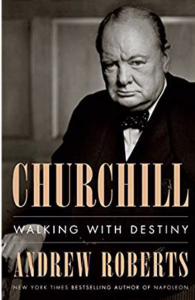 I have commented frequently here and elsewhere that liberals used to love Winston Churchill, while conservatives were often lukewarm at best. (Read William F. Buckley Jr’s caustic obituary of Churchill, for example.) He was praised to the skies by Arthur Schlesinger, Isaiah Berlin, and especially John F. Kennedy. Yet the furies of leftist political correctness now require that Churchill be denounced. Time magazine, which named Churchill its “Man of the Half-Century” in 1950, felt compelled to apologize for this when it came time to name its “Person of the Century” back in 2000, explaining that “Well, the passage of time can alter our perspective. A lot has happened since 1950. . . In his approach to domestic issues, individual rights and the liberties of colonial subjects, Churchill turned out to be a romantic refugee from a previous era who ended up on the wrong side of history.” You can always stop reading when you get to that favorite trope of lazy liberalism, “. . . the side of history.”
I have commented frequently here and elsewhere that liberals used to love Winston Churchill, while conservatives were often lukewarm at best. (Read William F. Buckley Jr’s caustic obituary of Churchill, for example.) He was praised to the skies by Arthur Schlesinger, Isaiah Berlin, and especially John F. Kennedy. Yet the furies of leftist political correctness now require that Churchill be denounced. Time magazine, which named Churchill its “Man of the Half-Century” in 1950, felt compelled to apologize for this when it came time to name its “Person of the Century” back in 2000, explaining that “Well, the passage of time can alter our perspective. A lot has happened since 1950. . . In his approach to domestic issues, individual rights and the liberties of colonial subjects, Churchill turned out to be a romantic refugee from a previous era who ended up on the wrong side of history.” You can always stop reading when you get to that favorite trope of lazy liberalism, “. . . the side of history.”
And then there was the recent disgrace of astronaut Scott Kelly, who cringed before a leftist twitter mob for the sin of quoting the most innocuous sentiment from Churchill.


As Mark Steyn commented, at a time when for the left, everyone is literally Hitler, even Churchill is Hitler.
So it comes as a pleasant surprise that the New York Times is printing in this weekend’s book review (but available online now) a shockingly positive review of Andrew Roberts’s grand new biography, Churchill: Walking With Destiny. calling it “the best one-volume biography of Churchill yet written.” The reviewer, Richard Aldous, a historian at Bard College, concludes:
Some may find Roberts’s emphasis on politics and war old-fashioned, indistinguishable, say, from the approach taken almost half a century ago by Henry Pelling. He is out of step with much of the best British history being written today, where the likes of Dominic Sandbrook, Or Rosenboim and John Bew have successfully blended cultural and intellectual history with the study of high politics. But it would be foolish to say Roberts made the wrong choice. He is Thucydidean in viewing decisions about war and politics, politics and war as the crux of the matter. A life defined by politics here rightly gets a political life. All told, it must surely be the best single-volume biography of Churchill yet written.
Is this allowed? We’ll see. Right now there aren’t any comments posted up, but I predict this review will get the Scott Kelly treatment, which will rightly send sensible people into orbit.
In the meantime, for Bay Area Power Line readers, I’m going to be hosting Andrew Roberts for a lecture on his book at Berkeley on Monday, December 3, at 5 pm in the Banatao Auditorium on the northeast corner of campus. The event will be free and open to the public, and I’m hoping to fix up a book signing as well as a reception afterward. I’m also hoping to get Andrew to sit down for a podcast with me, though his schedule is going to be very tight. Do please come if you are in the area. Should be a fun time.
Notice: All comments are subject to moderation. Our comments are intended to be a forum for civil discourse bearing on the subject under discussion. Commenters who stray beyond the bounds of civility or employ what we deem gratuitous vulgarity in a comment — including, but not limited to, “s***,” “f***,” “a*******,” or one of their many variants — will be banned without further notice in the sole discretion of the site moderator.